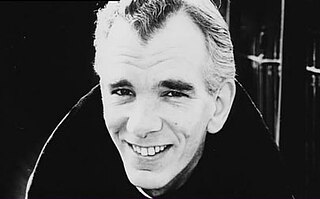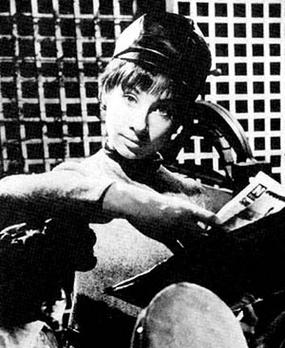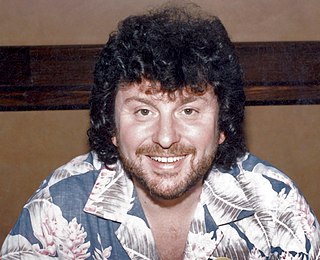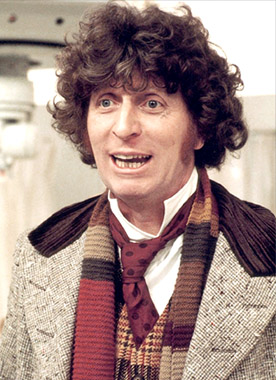
Shada is a story from the British science fiction television series Doctor Who. Written by the series' script editor Douglas Adams, it was intended as the final serial of the 1979–80 season but was never originally completed, owing to strike action at the BBC during studio recording. Entering production as a six-part story in 1979, plans were later revised for the story to be broadcast as a four-part story in 1980. Ultimately however, the story would never be completed in either format.

David Arthur Whitaker was an English television writer and novelist who worked on the early years of the science-fiction TV series Doctor Who. He served as the programme's first story editor, supervising the writing of its first 51 episodes from 1963 to 1964.

Terence Joseph Nation was a Welsh screenwriter and novelist. Especially known for his work in British television science fiction, he created the Daleks and Davros for Doctor Who, as well as the series Survivors and Blake's 7.
Remembrance of the Daleks is the first serial of the 25th season of the British science fiction television series Doctor Who. The serial was first broadcast in four weekly episodes from 5 to 26 October 1988. It was written by Ben Aaronovitch and directed by Andrew Morgan.

Robert Colin Holmes was a British television scriptwriter. For over 25 years he contributed to some of the most popular programmes screened in the UK. He is particularly remembered for his work on science fiction programmes, most notably his extensive contributions to Doctor Who, which included working as its script editor from 1974 to 1977.
Genesis of the Daleks is the fourth serial of the twelfth season of the British science fiction television series Doctor Who. It was written by Terry Nation and directed by David Maloney, and originally broadcast in six weekly parts from 8 March to 12 April 1975 on BBC1.
Doctor Who spin-offs refers to material created outside of, but related to, the long-running British science fiction television series Doctor Who.

Susan Foreman is a fictional character in the British science fiction television series Doctor Who. The granddaughter of the Doctor and original companion of their first incarnation, she was played by actress Carole Ann Ford from 1963 to 1964, in the show's first season and the first two stories of the second season. Ford reprised the role for the feature-length 20th anniversary episode The Five Doctors (1983) and the 30th anniversary charity special Dimensions in Time (1993).
Terrance William Dicks was an English author and television screenwriter, script editor and producer. In television, he had a long association with the BBC science-fiction series Doctor Who, working as a writer and also serving as the programme's script editor from 1968 to 1974. The Doctor Who News Page described him as "arguably the most prolific contributor to Doctor Who". He later became a script editor and producer of classic serials for the BBC.

John Turner, known professionally as John Nathan-Turner, was an English television producer. He was the ninth producer of the long-running BBC science fiction series Doctor Who and the final producer of the series' first run on television. He finished the role having become the longest-serving Doctor Who producer and cast Peter Davison, Colin Baker and Sylvester McCoy as the Fifth, Sixth and Seventh Doctors, respectively.

"Mission to the Unknown" is the second serial of the third season of the British science fiction television series Doctor Who. Written by Terry Nation and directed by Derek Martinus, the single episode was broadcast on BBC1 on 9 October 1965. The only standalone regular episode of the show's original run, it serves as an introduction to the 12-part story The Daleks' Master Plan. It is notable for the complete absence of the regular cast and the TARDIS; it is the only serial in the show's history not to feature the Doctor at all. The story focuses on Space Security Agent Marc Cory and his attempts to warn Earth of the Daleks' plan to take over the Solar System.
Warriors' Gate is the fifth serial of the 18th season of the British science fiction television series Doctor Who. It was written by Stephen Gallagher and was first broadcast in four weekly parts on BBC1 from 3 to 24 January 1981.
Eric Saward is a British radio scriptwriter who worked for the BBC as a television script editor and screenwriter on the science fiction series Doctor Who from 1982 until 1986. He wrote the stories The Visitation (1982), Earthshock (1982), Resurrection of the Daleks (1984) and Revelation of the Daleks (1985).

The Fourth Doctor is an incarnation of the Doctor, the protagonist of the British science fiction television series Doctor Who. He is portrayed by Tom Baker.
Frontios is the third serial of the 21st season of the British science fiction television series Doctor Who, which was first broadcast in four twice-weekly parts on BBC1 from 26 January to 3 February 1984.
Nicholas Pegg is a British actor, writer and director. Educated at Nottingham High School and graduating with a Master of Arts in English Literature from the University of Exeter, Pegg subsequently trained at the Guildford School of Acting.

Clayton James Hickman is a British scriptwriter, magazine editor, journalist and designer.

Renaissance of the Daleks is a Big Finish Productions audio drama based on the long-running British science fiction television series Doctor Who.
Doctor Who: The Lost Stories is a sci-fi audio series produced by Big Finish Productions of Doctor Who audio plays adapted from unused TV stories.









